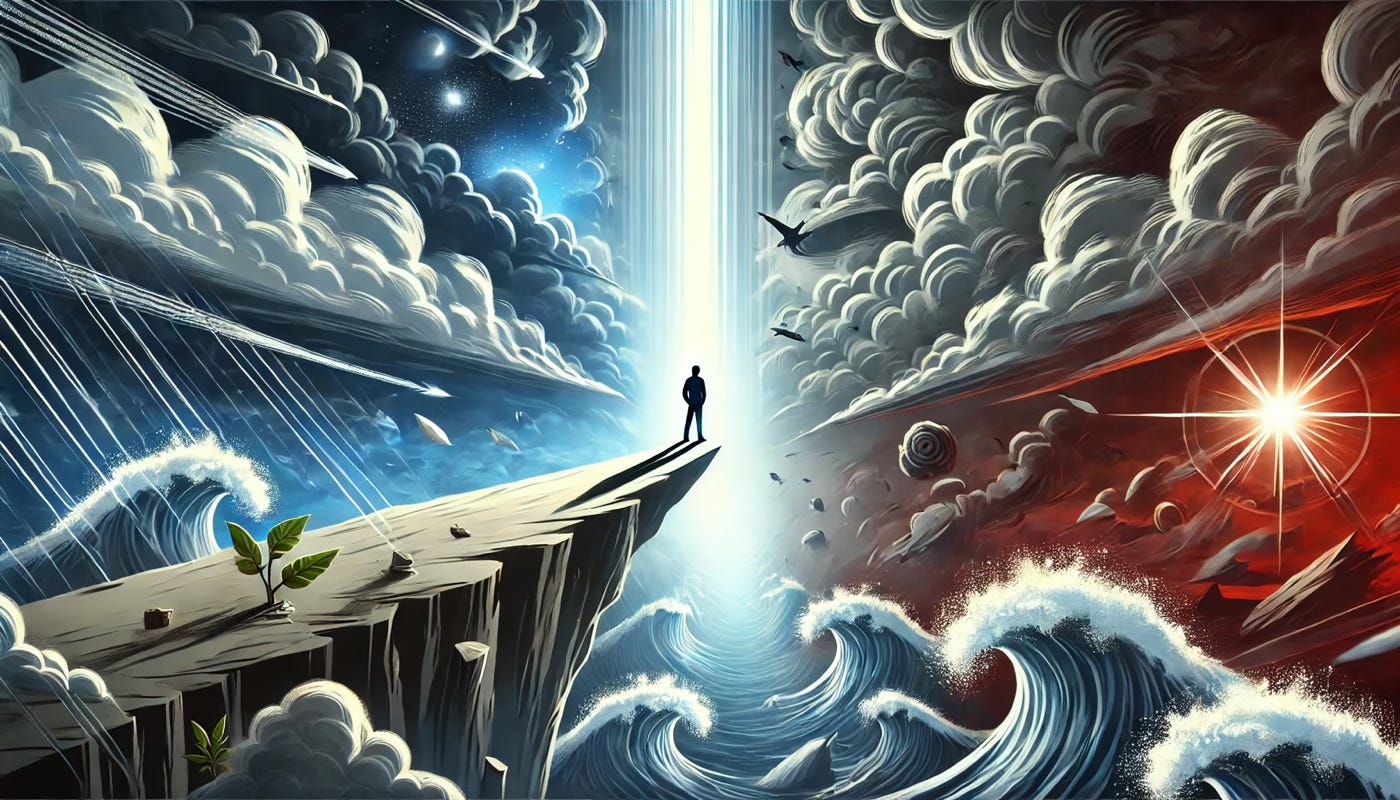Why We Always Assume the Worst: The Ancient Roots of Catastrophizing
Exploring the Origins, Psychology, and Strategies to Avoid the Trap of Worst-Case Thinking
One of the strangest changes in public debate in recent years is the rise of catastrophizing—the tendency to assume that failing to meet a demand will lead to catastrophic consequences. Whether it’s claims that “the world will end” or “everyone will suffer,” it’s always the worst-case scenario.
This behavior, known as catastrophizing, makes meaningful discussion and debate nearly impossible. Once someone starts down this road, it’s hard to challenge, question, or even engage with their beliefs. But where does catastrophizing come from, and how can we avoid falling into its trap?
While formally identified in modern psychology, catastrophizing has ancient roots. Its influence can be traced back to some of humanity’s oldest texts and myths, where exaggerated fears of the worst-case scenario often took center stage.
Ancient Examples of Catastrophizing
1. Religious Texts: The Book of Job (circa 6th century BCE)
In the Hebrew Bible, Job endures extreme suffering and assumes his hardships will only deepen. His friends also catastrophize, insisting his misfortunes must stem from grave sins, reflecting a common tendency to expect the worst in times of uncertainty.
2. Greek Mythology: Cassandra and Pandora’s Box (8th century BCE and earlier)
Cassandra, cursed to utter prophecies no one believes, obsessively warns of Troy’s destruction. While her fears prove accurate, her unrelenting focus on disaster mirrors catastrophizing. Similarly, Pandora’s Box reveals the ancient tendency to envision and dread worst-case scenarios when she unwittingly unleashes the world’s evils.
3. Philosophical Texts: Homer’s Iliad and Odyssey (8th century BCE)
Homer’s epics are full of characters expecting calamity. Odysseus repeatedly assumes his journey home will end in disaster, whether through death at sea or betrayal by loved ones. These texts showcase how ancient cultures grappled with anticipating danger, even when less dramatic outcomes were likely.
4. Stoic Philosophy: Seneca (4 BCE–65 CE)
Stoic philosophers like Seneca acknowledged humanity’s propensity to catastrophize and offered strategies to combat it. Seneca recommended imagining the worst-case scenario—not to dwell on it, but to prepare and reduce its emotional impact.
Why Do We Catastrophize?
Catastrophizing is a cognitive distortion in which people assume the worst possible outcome, often without evidence. It arises from a mix of psychological and emotional factors:
1. Survival Instincts
Humans evolved to anticipate danger as a survival mechanism. While this “better safe than sorry” approach was essential in early human history, it can lead to overestimating threats in modern life.
2. Anxiety and Stress
Under stress, the brain imagines the worst-case scenario to “prepare,” even if the outcome is doubtful.
3. Past Experiences
People who have faced trauma or setbacks may catastrophize as a protective mechanism, believing it shields them from future pain.
4. Cognitive Biases
Negativity Bias: Focusing more on negative possibilities than positive ones.
Confirmation Bias: Seeking evidence to support fears while ignoring contrary evidence.
5. Lack of Control
Feeling powerless can lead to catastrophizing, as imagining dire outcomes provides a false sense of preparation.
6. Perfectionism
Perfectionists may catastrophize due to high self-imposed standards, interpreting minor failures as catastrophic.
7. Cultural Influences
Like 24/7 news cycles, fear-driven environments amplify catastrophizing by constantly emphasizing worst-case outcomes.
Strategies to Stop Catastrophizing
Even with an understanding of its roots, everyone is tempted to catastrophize occasionally. Here are five strategies to keep it in check:
1. Challenge Your Thoughts
Ask, “What evidence do I have for this outcome?” Challenge assumptions with facts.
2. Reframe the Situation
Consider the best-case or most realistic outcome instead of focusing on the worst-case scenario.
3. Practice Mindfulness
Stay in the present moment. Mindfulness reduces overthinking and prevents spiraling into fear.
4. Seek Support
Share your concerns with someone who can offer perspective and help you see the bigger picture.
5. Focus on Solutions
Shift energy away from imagined disasters and toward actionable steps to improve the situation.
Final Thoughts
Catastrophizing is deeply embedded in human nature but doesn’t have to control our lives. Whether in a heated debate, a personal fear, or a societal narrative, recognizing and addressing this behavior allows for more thoughtful, productive engagement.
Next time you feel yourself predicting doom, pause and ask: Is this the story I’m telling myself, or is it reality?




